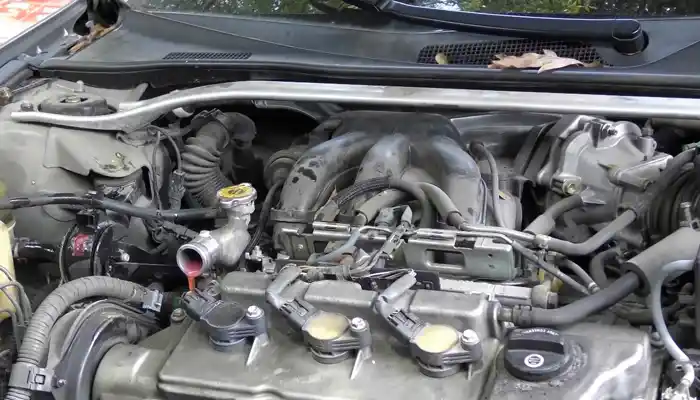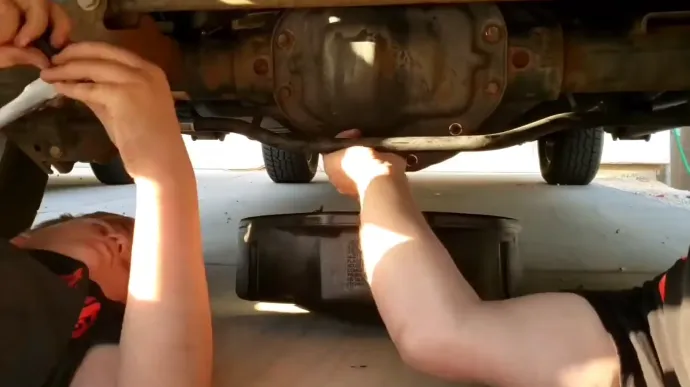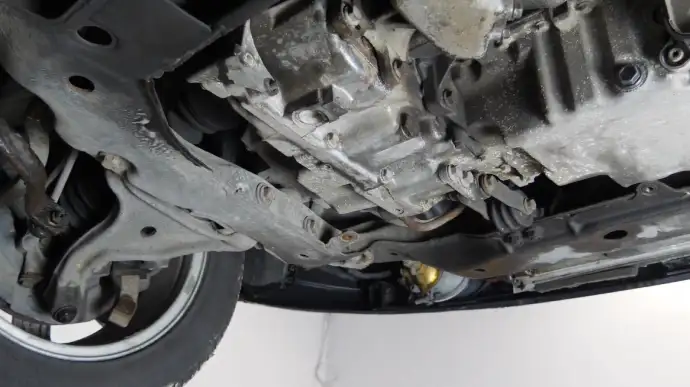Physical Address
304 North Cardinal St.
Dorchester Center, MA 02124
Physical Address
304 North Cardinal St.
Dorchester Center, MA 02124

A gear oil smell inside your car can be unpleasant and concerning, as it often indicates a potential issue with the vehicle’s transmission or differential. Whether you drive a manual or automatic, you need to get rid of the gear oil smell in your car to prevent further mechanical problems.
Inspect transmission and differential areas for leaks or damage. Promptly repair or replace any leaks or signs of wear and tear. Clean affected areas with a degreaser or brake cleaner. Maximize ventilation and use odor-absorbing products to eliminate residual odors.
Here, we will outline the steps to eliminate the gear oil smell and ensure your vehicle’s proper functioning. From inspection and cleaning to ventilation and maintenance, these steps will help you tackle the issue effectively, ensuring your car remains in top condition.

Whether you drive a manual or automatic, gear oil leaks can cause an unpleasant smell in your car. You need to follow a series of steps to get rid of the gear oil smell in your car.
Before addressing the issue, ensure your car is safely parked on a level surface, the engine is turned off, and the parking brake is engaged. Wear safety gloves and eye protection to protect yourself from any potential contact with the gear oil.
Then, identify the source of the gear oil smell. Ensure it is indeed coming from the gear oil or differential.
Inspect the Clutch System: The clutch system may be a source of the gear oil smell in manual cars. You should pay particular attention to it if it slips or has a leaky master or slave cylinder.
Check the Transmission and Differential: Ensure your transmission and differential components are properly sealed. Leaks from these areas can contribute to the smell.
Check the Transmission and Torque Converter: In automatic cars, the transmission and torque converter are common sources of gear oil smells.
Inspect Transmission Cooler Lines: Automatic transmissions may have cooler lines that can develop leaks over time. It contributes to the gear oil smell.
After inspecting the above components, check for worn-out or cracked seals and replace them as needed. Properly seal all connections and inspect regularly to keep gear oil smells away. Otherwise, the smell is likely to persist after cleaning or any other repairs you might have made.
To gather the necessary supplies for getting rid of the gear oil smell in your car, gather a degreaser or brake cleaner, a bucket, and a sponge or scrub brush.

After inspecting and gathering your cleaning materials, the next step is to begin the actual cleaning process.
You can easily eliminate the gear oil smell in your car by applying a degreaser or brake cleaner to the components from which the odor is coming.
After applying the degreaser or brake cleaner, wait a few minutes for it to effectively break down the gear oil and eliminate the smell in your car. The degreaser or brake cleaner needs time to penetrate and dissolve the oil completely.
The sitting process allows the cleaning agent to work into every nook and cranny where the gear oil may have seeped. This ensures a thorough cleaning and helps remove the unpleasant smell from your car.
Gently agitating the degreaser with a sponge or scrub brush will help remove the oil residue and the gear oil smell in your car. Use a back-and-forth motion to effectively dislodge the oil particles from surfaces.
Be careful not to apply excessive force, as it may damage sensitive components or wiring. Ensure that the sponge or brush is clean and free from debris to avoid introducing additional contaminants into the cleaning process.
Ensure to thoroughly wipe down all areas treated with the degreaser, including the engine compartment, exterior body, and any interior surfaces that may have come into contact with the gear oil. Properly disposing of the used cloth or paper towels will help prevent lingering smells.
To check the cabin air filter, simply locate the filter housing and remove it according to your car’s manual. The cabin air filter filters the air that enters the vehicle’s interior through the HVAC system. Over time, this filter can become clogged with dirt, debris, and odors, leading to a persistent smell in the car.
After all cleaning and freshening steps have been completed, it is important to take a few moments and assess the smell. If the smell persists, repeat the cleaning process until the odor is completely gone.
Now you have completed the cleaning and freshening process, it is time to focus on ventilation and odor elimination. This step ensures that fresh air can enter the car quickly and efficiently while eliminating odors.
Air out your car by opening all windows and doors to eliminate the gear oil smell. Doing this allows fresh air to circulate inside the vehicle, helping to remove the odor-causing particles.
Let your car sit in a well-ventilated area for a few hours to ensure the smell dissipates completely.
Additionally, you can use odor-absorbing products like activated charcoal or air fresheners to neutralize any remaining smells further. These products work by trapping and eliminating the odor molecules present in the air.
To maximize the effectiveness of ventilation and odor elimination, remember to run your car’s HVAC system with fresh air rather than recirculating the cabin air. This will prevent the smell from being trapped inside and help remove residual odors.
To eliminate the gear oil smell from your car, you should recheck for leaks in both manual and automatic cars.
Even after completing the previous steps and driving your car for a while, inspecting for any new signs of leaks or persistent odor is important. Minor leaks can sometimes go unnoticed; addressing them promptly will prevent the smell from returning.
Note: Regularly changing the transmission fluid and filter is essential for the proper functioning of automatic transmissions and to prevent oil leaks. If you haven’t done so recently, consider having this service performed by a professional mechanic.

There are most commonly two reasons why your car might smell like gear oil.
One possibility is that the gearbox is overheating. When the lubricating oil in the gearbox is finished or dirty, it can’t properly oil the gears, causing them to overheat and emit a strong odor.
Another reason could be that the oil in your car is expired or too old to lubricate the vehicle parts effectively. When the oil cannot lubricate the parts properly, it can lead to metal-to-metal friction, which results in the burning of metals and the distinct smell of gear oil.
If you’re regularly exposed to the smell of gear oil in your car, it may pose a potential risk to your health. While the smell may not be harmful, it indicates a possible problem with your car’s transmission or differential.
Ignoring these issues can lead to mechanical problems that could be expensive to fix. It’s important to address any unusual smells coming from your car’s gear oil promptly to prevent further damage.
Additionally, prolonged exposure to the smell of gear oil can cause irritation to the respiratory system, leading to symptoms such as coughing, wheezing, and difficulty breathing.
Therefore, taking necessary precautions and seeking professional help is advisable if you consistently encounter the smell of gear oil in your car.
Due to wear and tear, older vehicles are more prone to leaks and seal degradation. These factors can lead to the leakage of gear oil, resulting in a distinct smell.
The seals and gaskets in older cars tend to deteriorate over time, causing them to become less effective in preventing leaks. Additionally, the parts in older cars may wear more, increasing the likelihood of oil leaks.
It’s important to regularly check for any signs of leakage and address them promptly to prevent further damage and eliminate the gear oil smell in your car.
The presence of a gear oil smell in your car should never be ignored, as it can serve as an early warning of a more significant mechanical problem.
Using the steps outlined in this guide, you can not only eliminate the unpleasant odor but also maintain the health and performance of your vehicle. Regular inspection, effective cleaning, and appropriate maintenance will ensure that your car remains free from gear oil odors and operates smoothly on the road.
The gear oil smell isn’t harmful to your health but can indicate a more serious problem with your vehicle. This smell is more common in older cars due to wear and tear on the seals and gaskets.
So, if you ever encounter this unwelcome scent in your vehicle, take prompt action to keep your car in top shape and drive more comfortably.